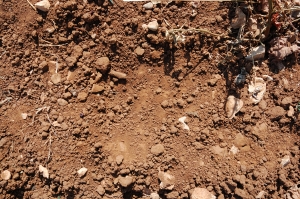Professor Ravi Naidu, the managing director of Australia's CRC for Contamination Assessment and Remediation of the Environment, is this year's recipient of the International Soil Science Award, presented annually by the Soil Science Society of America (SSSA).
"Global estimates of the amount of agricultural and pastoral soil lost each year range from 75 to 100 billion tonnes — that's over 10 tonnes a year for each person on Earth," Prof. Naidu said.
"Furthermore, a satellite study by the United Nations Food and Agriculture Organization (FAO) revealed about 1 per cent of the world's farm land has been lost every year for the past quarter century.
"Such rates of degradation are completely unsustainable and risk exhausting the world's food-producing soils within two to three generations."
Prof. Naidu said soil loss and contamination was a 'sleeping giant' among various threats to global food security — and had suffered international neglect for decades.
"Millions of tonnes of soil can be lost in minutes in a bad storm or flood event, as we saw only last year in Australia — and as America has just experienced. Yet new soil takes from thousands to millions of years to form."
Professor Naidu said he was delighted at the recent announcement by Prime Minister Julia Gillard of an Australian Working Group on Water, Soil and Food headed by the former Governor-General Major-General Michael Jeffery.
"I strongly commend the government for this forward looking move, which is part of the $700 million 'sustainable agriculture' stream in the next phase of the Caring for our Country program. It shows real leadership regarding soils issues in Australia.
"Australia's soils are old, leached and low in organic matter and excessive cultivation can impact what's called the critical zone - this is the soil lying between the plant and the groundwater table. Once soils in this zone are depleted, it is not possible to replenish them.
"Also a significant proportion are now affected by salinity. All this is relevant to domestic food security.
"However we must also recognise that Australia will not be secure if the world as a whole is food insecure. We are connected to the world, especially to Asia, where soils face major pressures.
"The new moves in Australia position us well to show increased global leadership in addressing the world soils crisis, just as we are doing at home.
"Australian scientists are already hard at work trying to stabilise soils in various threatened regions — but now can do even more, sooner and more effectively.
"There is an opportunity not only for Australia to help its neighbours deal with an seriously intractable problem, but also to generate substantial new export income around smart technologies for overcoming soil, water and environmental problems associated with agriculture."
Prof. Naidu said the FAO's most recent State of the World's Land and Water Report (SoLaW) had highlighted that more than half the Earth's land surface was now degraded — while only 10 per cent of it was improving.
"The report clearly stated: 'Across the world, a series of agricultural production systems are at risk due to a combination of excessive demographic pressure and unsustainable agricultural practices'," he points out.
"While Australia may have a food surplus, we can still be affected by very high global food prices, by refugee floods, and trade and conflict issues which may arise out of the collapse of farming systems in other parts of the world.
"If we want to mitigate those risks, both to ourselves, to others and to global stability, we need to apply our high levels of skill and knowledge in managing soils to more international as well as to Australian challenges."


-160x160-state_article-rel-cat.png)
-160x160-state_article-rel-cat.png)







-160x160-state_article-rel-cat.png)



